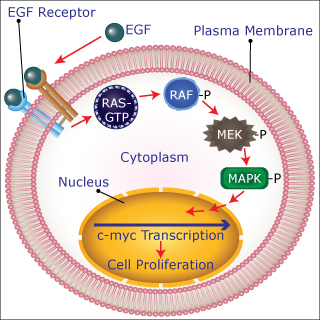
A schematic diagram illustrating a signal transduction pathway that is activated by the binding of a Epidermal Growth factor (EGF), produced by one cell type, to its specific membrane receptor on a target cell. (Original image by 7.016 instructors, adapted by MIT OpenCourseWare.)
Instructor(s)
Prof. Barbara Imperiali
Prof. Angelika Amon
Dr. Diviya Sinha
MIT Course Number
7.016
As Taught In
Fall 2014
Level
Undergraduate
Course Description
Course Features
Course Description
7.016 Introductory Biology provides an introduction to fundamental principles of biochemistry, molecular biology and genetics for understanding the functions of living systems. Taught for the first time in Fall 2013, this course covers examples of the use of chemical biology and twenty-first-century molecular genetics in understanding human health and therapeutic intervention.
The MIT Biology Department Introductory Biology courses, 7.012, 7.013, 7.014, 7.015, and 7.016 all cover the same core material, which includes the fundamental principles of biochemistry, genetics, molecular biology, and cell biology. Biological function at the molecular level is particularly emphasized and covers the structure and regulation of genes, as well as the structure and synthesis of proteins, how these molecules are integrated into cells, and how these cells are integrated into multicellular systems and organisms. In addition, each version of the subject has its own distinctive material.


